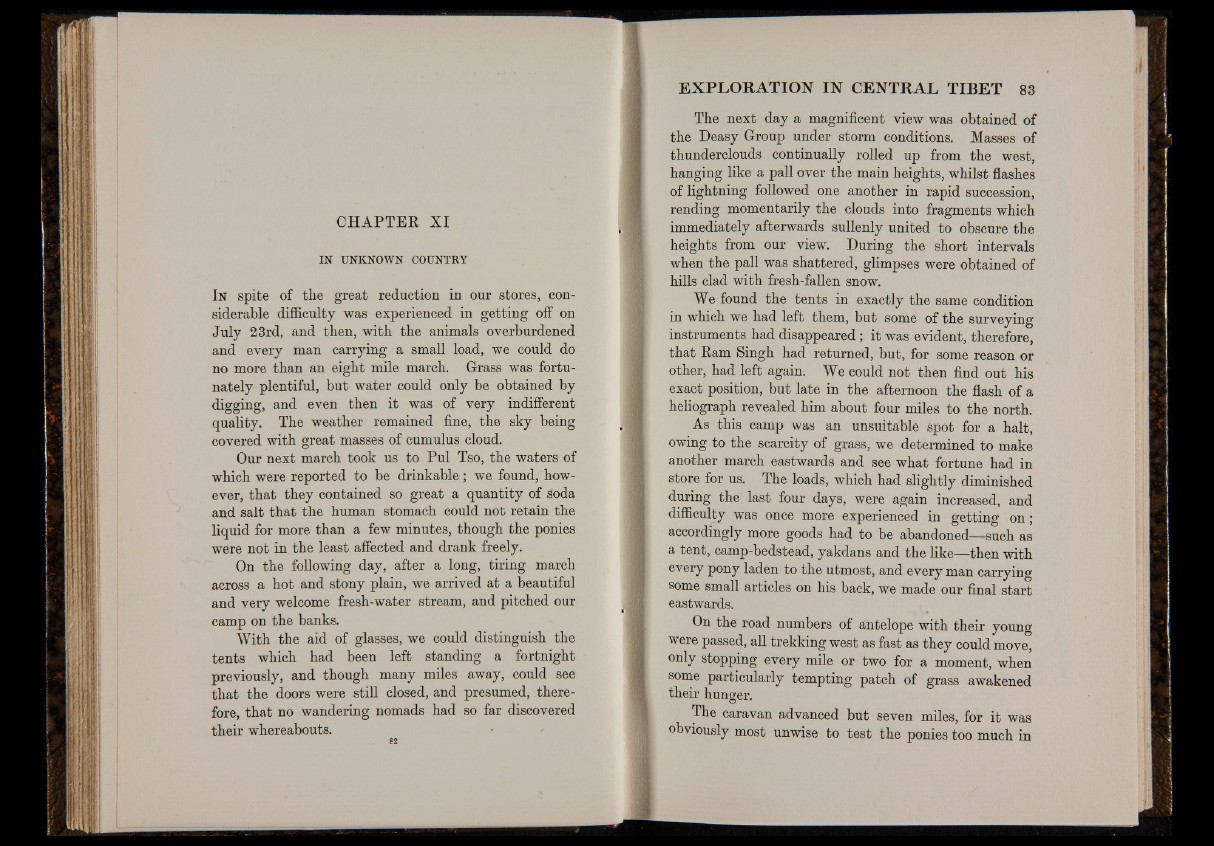
CHAPTER XI
IN UNKNOWN COUNTRY
In spite of the great reduction in our stores, considerable
difficulty was experienced in getting off on
July 23rd, and then, with the animals overburdened
and every man carrying a small load, we could do
no more than an eight mile march. Grass was fortunately
plentiful, but water could only be obtained by
digging, and even then it was of very indifferent
quality. The weather remained fine, the sky being
covered with great masses of cumulus cloud.
Our next march took us to Pul Tso, the waters of
which were reported to be drinkable; we found, however,
that they contained so great a quantity of ¡ioda
and salt that the human stomach could not retain the
liquid for more than a few minutes, though the ponies
were not in the least affected and drank freely.
On the following day, after a long, tiring march
across a hot and stony plain, we arrived at a beautiful
and very welcome fresh-water stream, and pitched our
camp on the banks.
With the aid of glasses, we could distinguish the
tents which had been left standing a fortnight
previously, and though many miles away, could see
that the doors were still closed, and presumed, therefore,
that no wandering nomads had so far discovered
their whereabouts.
The next day a magnificent view was obtained of
the Deasy Group under storm conditions. Masses of
thunderclouds continually rolled up from the west,
hanging like a pall over the main heights, whilst flashes
of lightning followed one another in rapid succession,
rending momentarily the clouds into fragments which
immediately afterwards sullenly united to obscure the
heights from our view. During the short intervals
when the pall was shattered, glimpses were obtained of
hills clad with fresh-fallen snow.
We found the tents in exactly the same condition
in which we had left them, but some of the surveying
instruments had disappeared; it was evident, therefore,
that Ram Singh had returned, but, for some reason or
other, had left again. We could not then find out his
exact position, but late in the afternoon the flash of a
heliograph revealed him about four miles to the north.
As this camp was an unsuitable spot for a halt,
owing to the scarcity of grass, we determined to make
another march eastwards and see what fortune had in
store for us. The loads, which had slightly diminished
during the last four days, were again increased, and
difficulty was once more experienced in getting o n ;
accordingly more goods had to be abandoned—such as
a tent, camp-bedstead, yakdans and the like—then with
every pony laden to the utmost, and every man carrying
some small articles on his back, we made our final start
eastwards.
On the road numbers of antelope with their young
were passed, all trekking west as fast as they could move,
only stopping every mile or two for a moment, when
some particularly tempting patch of grass awakened
their hunger.
The caravan advanced but seven miles, for it was
obviously most unwise to test the ponies too much in